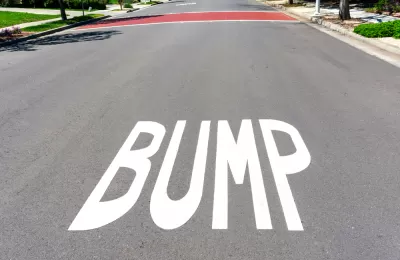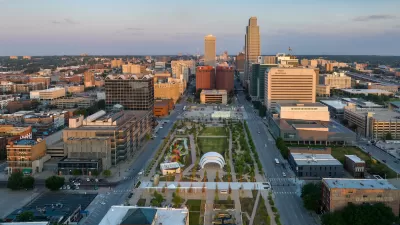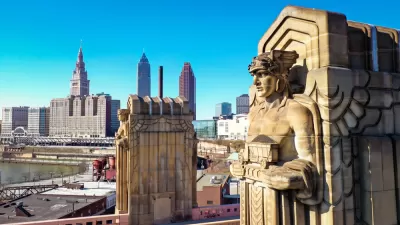The National League of Cities went to Congress and called on states to stop focusing on vehicle throughput and start prioritizing traffic safety.

The Highways and Transit subcommittee of the U.S. House Transportation and Infrastructure Committee held a hearing on the traffic safety crisis earlier this month. Elaine Clegg, the president of the Boise City Council in Idaho and chair of the Transportation and Infrastructure Services Committee of the National League of Cities, testified about how states prevent local governments from improving safety on streets.
Daniel C. Vock reports on Clegg’s testimony to the House subcommittee in an article for Route Fifty. Clegg cited examples from Boise to highlight how state departments of transportation focus on the speed and throughput of vehicles, rather than the safety of everyone who uses streets.
“In Boise, the state and city recently worked together on redesigning two roads along the edge of downtown. They are both one-way streets, with five lanes a piece. City officials, Clegg said, wanted to slow down vehicles and make it easier for pedestrians to cross. But the state disagreed,” reports Vock.
Vock reached out to the Idaho Transportation Department for a comment in reaction to Clegg’s testimony:
John Tomlinson, a spokesperson for the Idaho Transportation Department, told Route Fifty in an email that the department works with bicycle and pedestrian safety advocates and local communities to develop educational materials focused on saving lives. The agency also teams up with local law enforcement to raise awareness of bicycle and pedestrian safety in both urban and rural areas of the state, he said.
The tension between these two accounts is common around the country, according to Vock. Clegg and the National League of Cities proposed a list of recommendations meant to bridge the gap on traffic safety between the state and local levels.
- Requiring more transparency on state spending of federal transportation funds
- Regulation of vehicle design.
- Additional technical assistance for smaller cities.
- Speed delivery of federal traffic safety data.
- Improve the Manual on Uniform Traffic Control Devices based on data and research.
The recommendations above are listed with more detail in the source article.
FULL STORY: City Official: State Transportation Agencies Block Street Safety Progress

Maui's Vacation Rental Debate Turns Ugly
Verbal attacks, misinformation campaigns and fistfights plague a high-stakes debate to convert thousands of vacation rentals into long-term housing.

Planetizen Federal Action Tracker
A weekly monitor of how Trump’s orders and actions are impacting planners and planning in America.

San Francisco Suspends Traffic Calming Amidst Record Deaths
Citing “a challenging fiscal landscape,” the city will cease the program on the heels of 42 traffic deaths, including 24 pedestrians.

Defunct Pittsburgh Power Plant to Become Residential Tower
A decommissioned steam heat plant will be redeveloped into almost 100 affordable housing units.

Trump Prompts Restructuring of Transportation Research Board in “Unprecedented Overreach”
The TRB has eliminated more than half of its committees including those focused on climate, equity, and cities.

Amtrak Rolls Out New Orleans to Alabama “Mardi Gras” Train
The new service will operate morning and evening departures between Mobile and New Orleans.
Urban Design for Planners 1: Software Tools
This six-course series explores essential urban design concepts using open source software and equips planners with the tools they need to participate fully in the urban design process.
Planning for Universal Design
Learn the tools for implementing Universal Design in planning regulations.
Heyer Gruel & Associates PA
JM Goldson LLC
Custer County Colorado
City of Camden Redevelopment Agency
City of Astoria
Transportation Research & Education Center (TREC) at Portland State University
Jefferson Parish Government
Camden Redevelopment Agency
City of Claremont





























